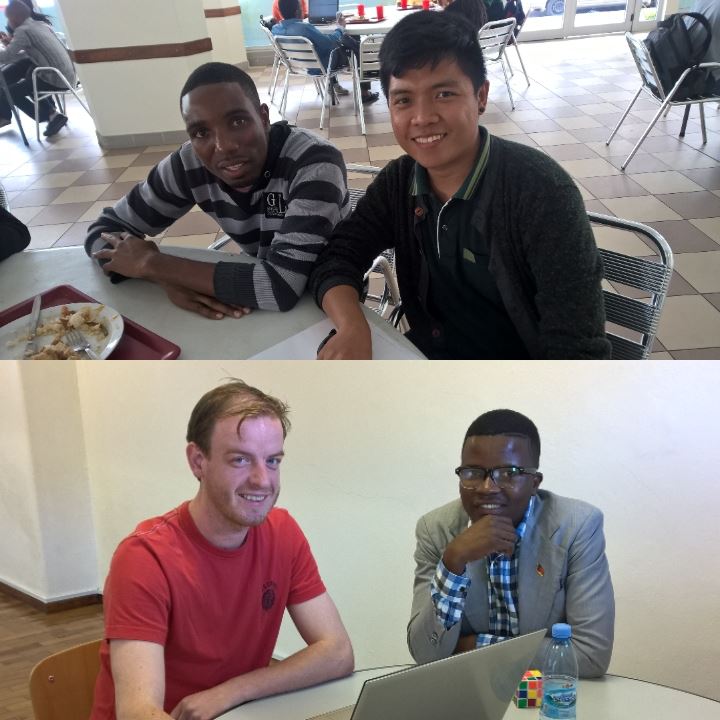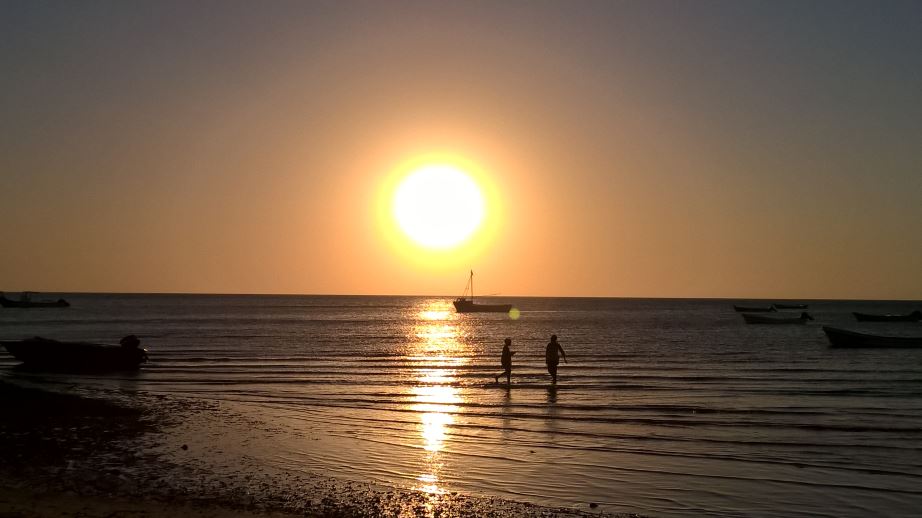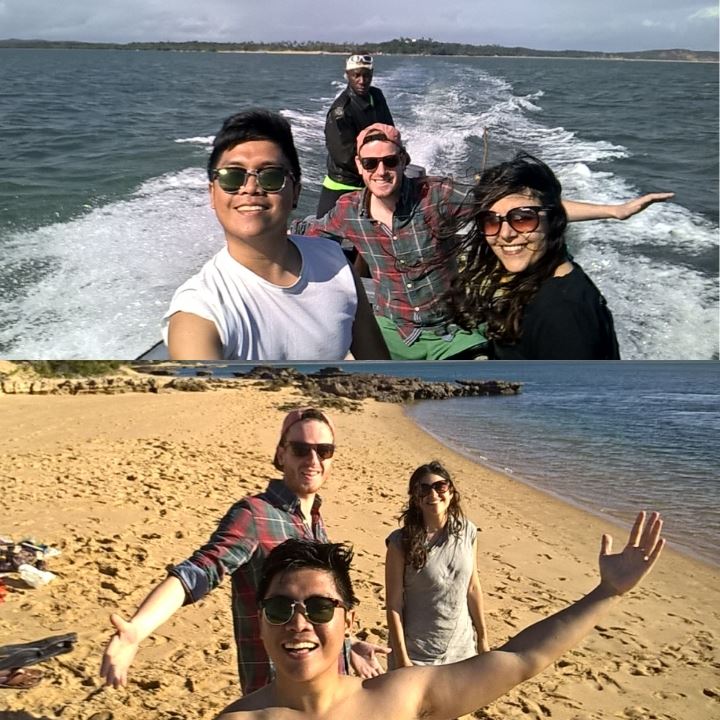by Jay-el
It was a week of balanced hard work and having fun. Our weekday schedule was hectic with several interviews and of course, data analyses and writing. And our weekend was jam-packed with sun, sea, and seafood at Ilha de Inhaca. Both had definitely satisfied our objectives on advancing on our researches and exploring Maputo at the same time.
Orienting our interpreters
From our group interview experience last week, Jesper and I realized the difficulty of not knowing Portuguese. Since we have our own topics and we have to go on our own way, and not to drag either Iana or Celma most of the time, Jesper and I decided to ask for help with our Mozambican friends to be our interpreter. Fortunately, it is study break here as well so it was not a problem to ask a part of their time. Actually, we immediately had an agreement with the first person we talked to. Jesper’s translator is Armando, a geology student and the one whom we met at the Faculty of Engineering during our first visit. Mine is Fernando, an international relations and diplomacy student whom I talked with during one of our breakfasts at SELF canteen. So our first work together was to orient them on what our project is all about and what are the data we need to achieve the study objective. It was a smooth discussion and they easily got a good grasp of the topic and what will their roles be.

Our interpreters, Fernando at the top and Armando at the bottom.
Interview, interview, interview
It’s our time to go on interviews on our own. My first stop is the Direcção de Saúde da Cidade de Maputo. I need the city health statistics on sanitation-related diseases. As for Nelson’s advice, it is better to go to the city health office and not at the Ministry of Health which deals with national concerns. So I had my data sheet prepared with me and Fernando was also well rehearsed on how to explain our objective at the City Health Office. At first we talked with the secretary. Eventually, she directed us to the assistant director Mr. Dionisio Matavel. He was very welcoming, considering we just came without an appointment. Mr. Matavel understood what I needed from his office, through Fernando. But as for formality and following their office’s rules, I had to provide my data sheet affixed with the letter of request to the director and a referral letter from UEM, all written in Portuguese. Through the help of Fernando, he translated all the documents that I drafted in English, edited by Nelson, and finally submitted to the secretary of the city health office two days after. I personally thanked Mr. Matavel for assisting and for his future response for my data request.

In fron of Direcção Nacional de Saúde da Cidade de Maputo.
Next stop is the Direcção de Agua e Saneamento do Municipio de Maputo. It was a follow-up meeting with Mr. Botelho Ferro as I had submitted to him the data sheet a week ago when we visited together with Celma. However, he seemed to be very busy. So instead of discussing the data I needed, he gave me a 1984 technical book about the Infulene WWTP, and escorted me to another colleague named Mr. Mario. Through Fernando, Mr. Mario explained the WWTP’s and sewerage system’s operation and maintenance processes. Apparently, the WWTP has only one person on site who is the security guard, and the electricity usage is only for the guard post as the WWTP is a lagoon type. The accumulated sediment through time is dredged every 3-4 years through external enterprise. The same operation and maintenance happens with the sewerage system. Mr. Mario is very helpful with explaining how the system works. However with the cost details I needed, he directed me to the accounting office for exact numbers. At the accounting office, Ms. Adélia provided details on the expenses of the management of their office such as for electricity, water, and telephone. She also provided costs on the discharge fee of wastewater collection trucks which is dependent on truck volume and it is paid on a monthly basis. Regarding the maintenance costs for cleaning and clearing of the sewerage and WWTP, she asked me to go back on another day to talk with another person.
Iana also had an interview with Ms. Odete Muximpua of Water and Sanitation Program of the World Bank. Due to the conflict with schedule, Jesper and I just provided Iana with some of the questions we wanted to address to Ms. Odete. We were interested on knowing more detailed information about the Water and Sanitation Program’s (WSP) reports. We had to read quite extensively and repeatedly these reports in order to understand how the whole supply chain of feacal sludge operation and management works in Maputo. Since Odete is one of the author, she discussed more in details about all the variables and complexities involved in feacal sludge management (FSM) starting from the type of facility until the empty procedure that goes to the WWTP or not. She also stated that right now they are involved in one project in the neighborhood of Chamanculo. However, with the political instability of the country right now, it is not possible to conclude what will be their plans for future projects.
This interview experience made me realize the differences of office formalities which has to be expected and must be followed accordingly.
Weekend in Inhaca Island
Finally, the weather allowed us to visit Inhaca Island. We took the 7.30 am public ferry, which is a 3-hour ride. Our oranges, chips and biscuits helped us survive the ride as it was early to have breakfast. Before reaching the island, we had to transfer to small motor boats because it is too shallow for the ferry to come closer to the island. But the short sleep and long ferry ride are worth it as we definitely enjoyed the island’s beauty, friendly people, and delicious seafood. At Sta. Maria, another side of the island, we laid in the sand and when our bodies are warm enough, we went on snorkeling seeing various colorful fishes. There, we were joined by two girls from Zimbabwe wherein we had a balance of fun talk and serious talk about the instability of Zimbabwe’s situation at the moment. As we got back to our accommodation, we got ready to watch the sunset by the sea and it was awesome. The best sunset I saw ever. The atmosphere seemed to be so clear that the flares of the sun were absent and it just slowly disappeared into the ocean as a perfectly round orange ball. For dinner, we all got our hands working, trying to enjoy all the lobster meat. Of course, we also had shrimp, squid and fish present in our plate. The night ended with a drink and talk with some resort guests, who are also residing in Maputo and working under various international organizations.
The next day we went to Ilha Portuguesa, which is a 10-minute boat ride form Inhaca. It is such a small island with circumference which can be walked through in less than an hour. Jesper had a run around the island while Iana and I had a small walk and several picture taking. The group we met the night before was also there kite-surfing and bird-watching. We did not stay long though in Ilha Portuguesa as the weather and our ferry schedule did not allow us too.
On our way home, we were lucky enough to take a speed boat at a bargain price. From 3-hour ride down to 45-minute ride was just perfect for us. In that boat, Jesper had a conversation with a South African researcher who is also called the “crow man”. He is spending his retirement exterminating the overabundant crows in Inhaca. The thousands of crows are setting tough competition for resources against other birds hence exterminating them will assure the survival of other bird species in the island.

Breathtaking sunset in Inhaca.
Capping off the weekend is the finals match of Euro 2106. Parabéns Portugal! The students in our residence went crazy in happiness.





















